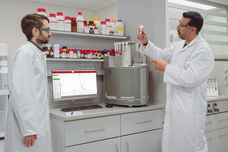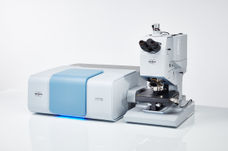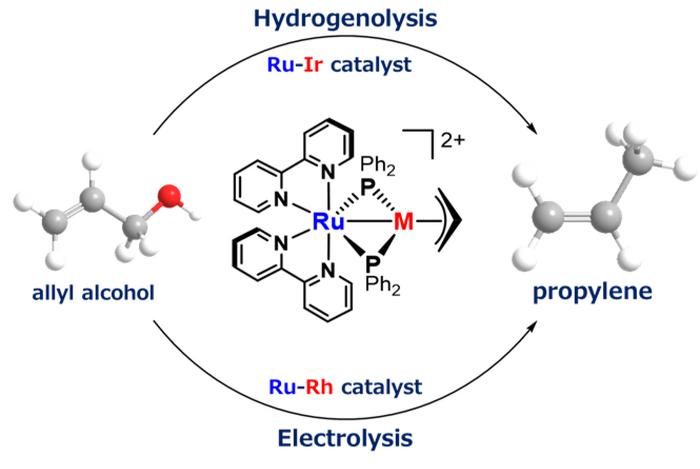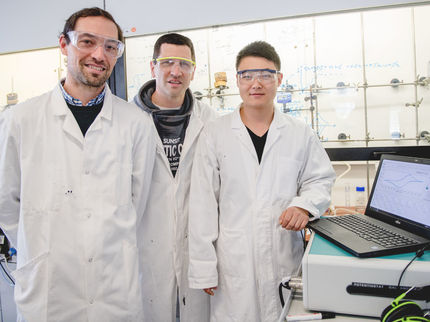Grant focuses on 'hydrogen sponge' for use in fuel-cell vehicles
Finding practical hydrogen storage technologies for vehicles powered by fuel cells is the focus of a $682,000 grant from the U.S. Department of Energy, awarded to Mike Chung, professor of materials science and engineering, Penn State.
Chung's recent research on superabsorbent polymers, which shows potential to aid in oil spill recovery and cleanup, may also be a storage vehicle for hydrogen fuel cells.
"My group developed hydrocarbon polymers with a high oil absorption capacity," he said. "The polymers provide an efficient way to separate and store the hydrocarbon molecules -- oils -- from water during spills."
He hopes to apply similar technology to create a hydrogen adsorbent. Adsorption occurs when thin layers of molecules adhere to the surface of solids or liquids. Chung said the difficulties faced in storing the hydrogen could be overcome with the adsorbent, which would condense the gas into supercritical liquid form. A liquid turns supercritical at the point when distinct liquid and gas phases do not exist.
Hydrogen can then be stored in pores within the adsorbent at ambient temperature and low-pressure conditions. The pores naturally form in the spaces between the polymer's molecules. This would allow more hydrogen to be stored without having to increase the size of the tank.
"The polymer would act as a 'hydrogen sponge' in the storage tanks," Chung said.
His research could be critical given the challenges that researchers face in storing and using hydrogen fuel safely and efficiently.
"We face many difficulties with hydrogen storage technology," he said. "The technology isn't as well established yet as other alternative fuel sources, such as solar and wind power."
Hydrogen gas comes from many sources, including coal gasification and electrolysis. Gasification uses high pressures, temperatures, oxygen and steam to separate the hydrogen from the coal. Electrolysis uses electricity to split water into hydrogen and oxygen.
After obtaining hydrogen, it can be stored either as a gas or liquid. Storing hydrogen as a gas requires tanks that can withstand extremely high pressures of up to 700 times normal atmospheric pressure. To store hydrogen as a liquid requires very cold temperatures -- lower than minus 436 degrees Fahrenheit -- to prevent the hydrogen from becoming a gas.
"Because of the temperatures that would be required to store liquid hydrogen, our best option right now is compressed hydrogen gas," said Chung. "However, we have to find a way to store it efficiently and economically."
This is where Chung's research comes in, which aligns with the Department of Energy's increased focus on hydrogen storage, technology and capability. One of the department's primary objectives by 2020 is to develop hydrogen storage systems that allow for refueling at ambient temperatures, low pressures and for driving ranges of more than 300 miles.
Hydrogen has the highest energy per mass of any fuel. According to the Department of Energy, motors in fuel cell vehicles that run on hydrogen are often two to three times more efficient than those powered by gasoline.
"Hydrogen-powered fuel cell vehicles have the potential to be quite efficient, which is great because hydrogen fuel is the cleanest fuel available," Chung said.
Fuel cell vehicles, which typically release zero carbon emissions, generate power for their motors through electrochemical processes that use compressed hydrogen and oxygen -- air -- while only emitting water through the tailpipes.
Chung's grant is funded through September 2019.
Most read news
Topics
Organizations
Other news from the department science
These products might interest you

Eclipse by Wyatt Technology
FFF-MALS system for separation and characterization of macromolecules and nanoparticles
The latest and most innovative FFF system designed for highest usability, robustness and data quality

Spinsolve Benchtop NMR by Magritek
Spinsolve Benchtop NMR
Spinsolve is a revolutionary multinuclear NMR spectrometer that provides the best performance

HYPERION II by Bruker
FT-IR and IR laser imaging (QCL) microscope for research and development
Analyze macroscopic samples with microscopic resolution (5 µm) in seconds

Get the chemical industry in your inbox
By submitting this form you agree that LUMITOS AG will send you the newsletter(s) selected above by email. Your data will not be passed on to third parties. Your data will be stored and processed in accordance with our data protection regulations. LUMITOS may contact you by email for the purpose of advertising or market and opinion surveys. You can revoke your consent at any time without giving reasons to LUMITOS AG, Ernst-Augustin-Str. 2, 12489 Berlin, Germany or by e-mail at revoke@lumitos.com with effect for the future. In addition, each email contains a link to unsubscribe from the corresponding newsletter.
Most read news
More news from our other portals
Last viewed contents

Comprehensive and User-Friendly Chemistry News, Constantly Updated - ChemEurope.COM expands its daily news coverage
Category:Radiobiology
Biotin
Folic_acid

The Nobel Prize in Physics 2022 goes to three quantum researchers from France, USA and Austria - Entangled states – from theory to technology






























































